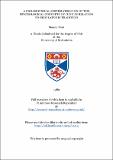Files in this item
A philosophical systematisation of the psychological concepts of Jung in relation to Neoplatonic tradition
Item metadata
| dc.contributor.advisor | Hall, G. B. | |
| dc.contributor.author | Mori, Masaki | |
| dc.coverage.spatial | 519 p. | en_US |
| dc.date.accessioned | 2018-07-09T10:48:37Z | |
| dc.date.available | 2018-07-09T10:48:37Z | |
| dc.date.issued | 1989 | |
| dc.identifier.uri | https://hdl.handle.net/10023/15114 | |
| dc.description.abstract | Jung developed various psychological concepts (for example, the 'archetypes') in an attempt to explain the special modalities of relationship between the noumenal (unconscious) realities, or between the noumenal (unconscious) and phenomenal (conscious) realities. However, in so doing, he left any coherent structural relationships between these concepts ambiguous. In this dissertation, therefore, I will attempt to shape the innate structural relationships of these concepts into a more philosophically-oriented, psycho-cosmological scheme. I will first devote my attention to two cosmogonic principles, the 'pleroma' and 'Abraxas', which occur in Jung's VII Sermones ad Mortuos. Then, after examining the structural similarities between these cosmogonic principles of Jung and the concepts articulated in the philosophical systems of pagan and Christian Neoplatonic thinkers, I will propose the possibility of an organic link between the two cosmogonic principles and the other psychological concepts in the main body of Jung's works, together with their formation into a complete psycho-cosmological scheme akin to the philosophical systems of the Neoplatonists. Secondly, I will give an exposition and analysis of the overall concepts of Jung, based on his own writings, on the interpretations placed on them by Jungian scholars such as von Franz, and on my own interpretations of Jung's concepts. Finally, I will examine in greater detail the philosophical system developed by Proclus, and, after comparing his concepts with the parallel but fragmentary concepts of Jung (fragmentary since they lack any clear structural interrelationships), I will conclude that Proclus' highly systematic philosophical system provides an ideal model, or philosophical schematisation, for the psychological concepts of Jung. | en_US |
| dc.language.iso | en | en_US |
| dc.publisher | University of St Andrews | |
| dc.subject.lcc | BF173.J8M7 | |
| dc.subject.lcsh | Psychoanalysis | en |
| dc.title | A philosophical systematisation of the psychological concepts of Jung in relation to Neoplatonic tradition | en_US |
| dc.type | Thesis | en_US |
| dc.type.qualificationlevel | Doctoral | en_US |
| dc.type.qualificationname | PhD Doctor of Philosophy | en_US |
| dc.publisher.institution | The University of St Andrews | en_US |
This item appears in the following Collection(s)
Items in the St Andrews Research Repository are protected by copyright, with all rights reserved, unless otherwise indicated.

